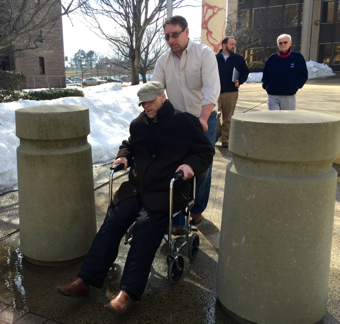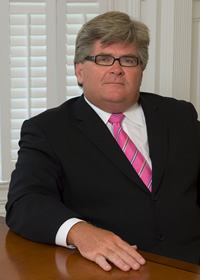 A federal judge handed down a 5‑year prison sentence Wednesday to an Oxford man who swindled several close friends and their families out of more than $1 million.
A federal judge handed down a 5‑year prison sentence Wednesday to an Oxford man who swindled several close friends and their families out of more than $1 million.
But the man, Robert E. Lee Jr., likely won’t serve a day in jail, because — barring a miracle in the form of a “last-ditch” clinical medical trial — he will probably be dead from cancer by the time he has to surrender to custody May 1.
Lee, 51, pleaded guilty in December to five counts of wire fraud and theoretically faced 100 years in prison at his sentencing.
Essentially, Lee operated a classic Ponzi scheme, in which a criminal takes money and says he’s investing it, while really stealing it, and using new investors’ money to pay purported returns to old clients.
And though U.S. District Judge Jeffrey Meyer blasted the “predatory” and “parasitic” deceptions Lee used to bilk his friends, the judge said he was convinced by a doctor’s letter saying Lee was eligible for a last-gasp clinical cancer treatment trial in which he couldn’t participate if jailed immediately.
“So I’m not sending you to prison today,” the judge told Lee at the end of the four-hour hearing. “Not when this hope exists.”
Hope was a theme of Wednesday’s sentencing. A parade of Lee’s victims told Judge Meyer that they had lost their own as a result of Lee’s swindling.
‘It Was All A Lie’
Paul Stephens, a victim of Lee’s scheme, told Judge Meyer that Lee was more than a broker to him — the two became as close as brothers.
He spoke to Lee at least once a day, seven days a week. They texted each other pictures of their children. They went on double dates with their wives in New York City.
When Stephens got engaged, Lee spoke at the rehearsal dinner.
When he learned Lee had been diagnosed with cancer, Stephens sought out the contact information for a German physician who had developed an innovative new treatment method.
“I thought I’d finally met someone who was honest, trustworthy, and that I could rely on,” Stephens said.
But things began to deteriorate after Stephens gave Lee $340,000 to put into what Lee told him was a “private” investment opportunity in Twitter, the social media giant, in 2012.
The company went public a year later — but Stephens never saw a dime of his investment back.
“I believe that you should impose the harshest penalty that you possibly could,” Stephens said.
Lori DeAngelis, another victim, told Judge Meyer a similar story.
Before Facebook went public, she told the judge that Lee had offered her and her husband a chance to buy stock in the company at $30 per share.
“But it was all a lie,” she told the judge.
She said their lives are in such ruins that they ruefully refer to events in their lives as having occurred “before Robert Lee or after Robert Lee.”
Michael Fatse spoke on behalf of himself, his friends, and many members of his extended family who had invested hundreds of thousands of dollars with Lee over the course of more than 20 years.
Lee, “polite and charming,” became part of the family. He was like a brother, Fatse said, attending his parents’ 50th anniversary party.
But it all came crashing down in July 2013 when Lee couldn’t come up with funds Fatse had asked for.
He said Lee came clean to him during a meeting in his father’s kitchen.
“He sat across the table from my father and I and told us it was all a lie,” Fatse said. He asked the judge to send Lee to prison.
Why?
After more than two hours of statements from seven of the victims, Lee and his family tried to paint a different picture.
Lee’s lawyer, Michael Hillis, played the judge a video of Lee’s wife, who said Lee “has a heart bigger than himself.”
“He’s never been malicious or greedy,” she said, and has taught the couple’s two young sons to be upstanding people. “I know this man would never take anything that wasn’t his.”
Asked by Judge Meyer if he had anything to say, Lee leaned forward slowly in his wheelchair and apologized to his victims.
“I’m really very sorry for any and all the problems that I have caused,” he said, barely audible as he gasped for air between breaths. “My intention was never to hurt anybody.”
He said things “got out of hand” and asked for their forgiveness.
“I wish I could go back in time and give you back the choices you should have been able to have,” he said.
After Lee’s statement, Judge Meyer interjected, pointing out all of Lee’s victims, and noted that Lee had left something out of his apology.
Why’d you do it?
Lee didn’t answer directly, but said the scheme began after some of his investors lost money.
“I started paying back losses out of my own pocket,” he said, denying any “malicious” intent. “Everything I made, I gave it back to everybody else.”
 Hillis said his client “could die any minute” and was the most infirm defendant he had ever seen at a sentencing in more than 20 years practicing law.
Hillis said his client “could die any minute” and was the most infirm defendant he had ever seen at a sentencing in more than 20 years practicing law.
He argued that even if Lee went to prison, he would almost instantly become a prime candidate for “compassionate release.”
“He got caught not being able to pay people back and he got into an endless loop,” Hillis said of his client. “He tried to rob Peter to pay Paul.”
“It’s very hard to ask for compassion when people have been harmed and been injured,” Hillis said, asking victims to forgive his client nonetheless.
Lee had gotten up from a Hospice bed to come to Wednesday’s sentencing, Hillis said, and has been living on borrowed time for the past year due only to the work of his doctors at the Smilow Cancer Hospital at Yale-New Haven.
Though federal sentencing guidelines called for Lee to serve between 51 and 63 month behind bars, Hillis asked the judge to spare his client prison.
Lee’s cancer, synovial sarcoma, is “quietly suffocating him,” Hillis said.
But if spared jail he could participate in a new clinical trial Hillis described as a “last-ditch effort to give him a few more days.”
‘Built On Lies’
The prosecutor in the case, Assistant U.S. Attorney David Huang, asked Judge Meyer to send Lee to prison immediately.
“All of Mr. Lee’s conduct was built on lies,” Huang said, dismissing Hillis’ call for compassion. “What brought us here today is not Mr. Lee’s cancer. It is Mr. Lee’s crime.”
“Consider compassion for the victims, and the justice they deserve,” Huang asked the judge, noting that Lee had preyed on the sympathies of many of his victims when he was first diagnosed.
“It would be a cruel irony if Mr. Lee used his cancer in furtherance of his fraud and then used it once again to escape responsibility,” Huang said.
‘Astounding’
Judge Meyer took a recess to consider the arguments before returning to the bench and telling Lee he wasn’t buying his.
“I think that you have very little insight into what it is you did wrong,” the judge told Lee, saying the comments he had made minutes earlier showed “an element of self-pollution.”
“To say that what you did is not malicious to me is very difficult, very difficult to understand when you think about the astounding impact this has had,” Judge Meyer said.
He called Lee’s conduct predatory and parasitic, and told Lee he had even “exploited your own cancer” to “prolong a day of reckoning.”
But the judge went on to note Lee’s health as a major mitigating factor in the case.
Though Lee perpetrated “one of the worst financial crimes I’ve seen,” the judge said Lee was also the sickest defendant who had ever stood before him.
He cited a letter from Lee’s doctor saying Lee was eligible for the clinical trial, but could not take part if in federal prison.
“I guess it all comes down to the fact that although I am a judge, and I’m given considerable powers as a judge, I’m not God,” Judge Meyer said.
He told the victims in the courtroom that he heard their pleas loud and clear, but would not imprison Lee Wednesday “if I’m told there is some possibility of saving a life.”
“Whatever sentence I impose, it doesn’t make you whole,” the judge told them, saying he had faith that government lawyers would track down Lee’s assets and arrange for as much restitution as possible.
He then sentenced Lee to 63 months behind bars, but granted a request from Hillis to give Lee until May 1 to “self-surrender” to the feds.
The judge also ordered $1,150,815 in restitution in the case, and forfeit $358,077.17 that was held in an online trading account at the time of his arrest.